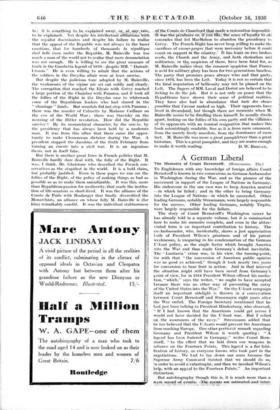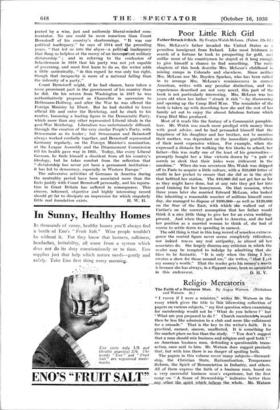The Memoirs of Count Bernstorff. (Heinemann. 21a.) -
A German Liberal
To Englishmen with any knowledge of foreign affairs . Count Bemstorff is known in two connexions, as German Ambassador in Washington during the War, and as the pioneer of the movement in support of the League of Nations in Germany. His endeavour in the one case was to keep America neutral —in which he failed ; and in the other to bring Germany into the League of Nations—in which he succeeded. either leading Germans, notably Stresemann, were, largely responsible for the success. Other leading Germans, f notably Tirpitz, were largely responsible for the failure. The story of Count Bernstorff's Washington career he has already told in a separate volume, but it is stumn- arised here to make his memoirs complete, and even in the abbre- viated form is an important contribution to history. The ex-Ambassador, who, incidentally, shows a just appreciation Loth of President Wilson's greatness and Of US' Patent weaknesses, is unsparing in his condemnation- of the German U-boat. policy, as the single factor which brought _America into the War and thus made Germany's defeat inevitable. The Lusitania ' crime was, in his view, the turning-point, for with that "the conversion of American public 'opinion was as good as achieved," though it took nearly, two years for conversion to bear fruit in action. And in Ai* interval the situation might still have been 'saved from Germany's point of view, for in 1916 President Wilson offered his media- tion, "which," says the writer, "we ought to have accepted because there Was no other way of preventing the entry of the United States into the War." On the U-boat campaign itself an important sidelight, is thrown in a- oconVeraation between, Count Bernstorfraird Stresemaiii eight. years after the War ended. The Fcireigri Secretary mentioned that he had just been talking to President Hindenburg, who observed, "If I had known that the Americans could get across I would not have decided for the U-boat war. But I relied on the assurances of the navy." Stresemann added that he too believed that the U-boats would 'prevent the Americans from reaching Europe. One other pertinent remark regarding Germany and President Wilson- Li worth quoting : "A legend has been fostered in Germany," writes Count Bern- storff, "to the effect that we laid down our weapons in reliance on the Fourteen .Points. This legend is a fiat falsi- fication of history, as everyone knows who took part in the negotiations. We bad to lay down our arms because the Supreme Army Command insisted that we should do so, in orderto-avold esfeataitrophe, And then Weinvoked Wilson's help, with an appeal to the Fourteen Points." An important distinction.
But autobiography though this is, it is much more than a sc.t4te aveord,.ackveata.,t axe ,aatimateckand- inter!.
_ preted by a wise, just and uniformly liberal-minded com- mentator. No one could be more conscious than Count Bernstorff of his country's shortcomings. "It was our political inadecjimey," he says of 1914 and the preceding years, "that led us into the abyss—a political inadequacy that flung us helpless at the mercy of an incompetent military dictatorship " ; and in referring to the confession of Schcidemann in 1918 that his party was not yet capable of governing, and must first learn to do so, the writer adds a little sardonically, " in this regard he was only too right, though that incapacity is more of a national failing than the infirmity of a party."
Count Bernstorff might, if he had chosen, have taken a more prominent part in the government of his country than he did. On his return from Washington in 1917 he was authoritatively proposed as Chancellor in succession to Bethmann-Hollweg, and after the War he was offered the Foreign Ministry by Ebert. But he had decided to leave official life and enter the Reichstag, and he stuck to his resolve, becoming a leading figure in the Democratic Party, which more than any other represented Liberal ideals in the post-War Reichstag. Liberalism was unfortunately diffused, through the creation of the very similar People's Patty, with Stresemann as its leader ; but Stresernann and Bernstorff always worked cordially together, and Bernstorff represented Germany regularly, on the Foreign Minister's nomination, at the League Assembly and the Disarmament Commission till his health gave way in 1931. 'Today, like every Liberal German, he finds himself a dissident from all his country's ideology, but he takes comfort from the reflection that "dictatorship has never yet been a permanent institution ; it has led to democracy, especially in Western Europe."
The subversive activities of Germans in America during the neutrality period have been associated more than the facts justify with Count Bernstorff personally, and his reputa- tion in Great Britain has suffered in consequence. This sincere, informed, objective and highly interesting record should 0' far to dissipate an impression for which singularly





















































 Previous page
Previous page